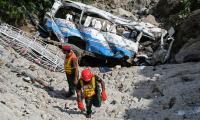All federal and provincial departments dealing with marine resources and security still appear to be shifting responsibility over the oil slick that formed off the Clifton beach two days ago.
Concerns of environmentalists were yet to be assuaged as most of the marine authorities said they were neither responsible for the oil spill nor did they have any idea about the cause. “The Karachi Port Trust is not responsible for this spill as none of its ships or installations were found to have spilled any oil,” said a spokesman for the KPT.
Instead, the spokesperson stated that under the National Marine Disaster Contingency Plan (NMDCP), it was the responsibility of the marine authorities to identify the source of any oil spill in the area of Clifton and Sea View and to take remedial measures.
The Maritime Security Agency (MSA) was also clueless about the source of the oil spill and termed it a ‘monsoonal activity’ which was not a serious issue and had nothing to do with marine pollution. Their spokesperson, however, assured he would ascertain its cause and respond back.
Ironically, the Sindh Environmental Protection Agency (Sepa) was also not in a position to identify the cause of the spill and stated that it had yet to contact the authorities concerned including the KPT, MSA, Karachi Fish Harbour Authority (KFHA) and Pakistan Navy to ascertain their version on the issue.
The oil slick reported on Monday made it difficult for beach-goers and picnickers to enjoy their day out on the third day of Eidul Azha. Experts said the oil spill was spread between the McDonald and Village restaurants and is said to have extended beyond the Devil’s Point.
However, an expert on marine pollution who visited the area on Tuesday and Wednesday claimed the oil slick was three to four months old and had not happened within Pakistan’s territorial waters.
Requesting anonymity, the officials said, “This is crude oil which spilled somewhere in the Arabian Sea in an area that does not come under Pakistan’s territory. This slick is possibly three to four months old and is in the advanced stages of weathering.”
The expert claimed that nothing could be done now except wait for a few days until it settles down. He explained that crude oil weathers off through evaporation, emulsification and other chemical processes.
“The colour of the oil is brownish, which indicates that it is in the advanced stages of weathering. After emulsification, it would go through the process of dissolution, oxidation, sedimentation, get absorbed into the sand and then biodegrade,” he said.
According to him, in addition to oil spills, industrial and domestic effluent and the thousands of gallons of other pollutants being discharged into the sea are the actual cause of marine pollution, also affecting the people.
This picture, taken on January 30, 2023, shows commuters passing through the Empress Market in the port city of...
This representational image shows a handcuffed person. — Pexels/FileThe Rangers, in a joint intelligence-based...
The image shows a vehicle of the Pakistan Customs. — APP/FilePakistan Customs Enforcement officials on Monday...
The founding director of the SIUT, Dr Adib Rizvi addresses an event in this image released on January 8, 2020. —...
NED University entrance can be seen in this image. — Facebook@NED University of Engineering & Technology/FileThree...
Sindh Planning & Development, and Energy Minister Syed Nasir Hussain Shah addresses a press conference on July 13,...







